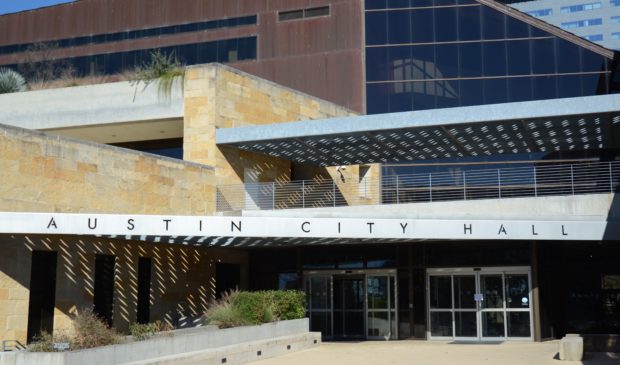New campaign finance rules in the works
Friday, February 24, 2017 by
Jo Clifton Two City Council members, Ellen Troxclair and Jimmy Flannigan, are collecting campaign funds in anticipation of re-election campaigns that seem far in the future. Troxclair is likely to run for re-election in November 2018 for her District 8 seat, but Flannigan will not be up for re-election until November 2020.
Both are taking advantage of the fact that Austin currently has no blackout period for candidates seeking election or re-election to Council. Council Member Leslie Pool and several of her colleagues intend to change that.
Last year, then-Council Member Don Zimmerman won part of a lawsuit challenging the city’s campaign finance regulations. Federal Judge Lee Yeakel threw out the part of the law that allowed candidates to raise money only during the six months prior to an election. However, the judge left open the possibility that the city could adopt a longer time period for raising campaign funds.
Zimmerman has filed an appeal with the U.S. 5th Circuit Court of Appeals on other issues on which the city prevailed, including the amount candidates can take from people living outside the city and the $350 limit on individual contributions.
Troxclair told the Austin Monitor on Thursday that a number of her constituents had asked how they might donate money after her heated exchange with Council Member Greg Casar over city funding for legal services to help undocumented immigrants.
After those requests, Troxclair said she tweeted out a link for donations. She said she is well aware that anyone who contributes the maximum $350 now will not be eligible to contribute again. However, she said she thought it was a good idea to allow those who wanted to contribute now to do so.
Troxclair is also aware, as is District 6’s Flannigan, that Council can decide to enact a new blackout period whenever it chooses to do so.
Neither Flannigan nor Troxclair wanted to discuss how much money they have raised, and under the current ordinance they will not have to report those contributions until July, according to City Clerk Jannette Goodall.
Pool told the Monitor that the lack of a blackout period “doesn’t sit well with me, and it doesn’t sit well with many on the Council.”
As currently envisioned, the new ordinance would allow collection of campaign funds one year before an election, but only by those running in that election. Pool said she thought winning candidates should also be able to raise money for six months after an election in order to pay off their debts. However, she would likely put no time limit on fundraising for those who lost elections. As a practical matter, election losers don’t have much time to raise money anyway.
Casar was re-elected in November but continues to have a legal battle with Laura Pressley, the candidate he beat for the District 4 seat in 2014.
“I’m not raising money, and I think we should close the fundraising window as soon as possible,” he said. “Voters want it to be closed. We should set up a constitutionally defensible blackout period.”
Casar won his battle with Pressley at both the district court and appeals court level. The courts have also said that Pressley must pay Casar’s attorneys’ fees. Previously, Casar raised money not just for his campaign but also to pay his attorneys. Thursday night, Casar said the 3rd Court of Appeals had just denied Pressley’s attorney’s motion for rehearing and reconsideration.
Casar told the Monitor, “I don’t know what it’s like to be on City Council without (Pressley). Hopefully, the sanctions will cover my legal expenses.”
None of the other Council members appear to be raising money for re-election.
As for Zimmerman’s lawsuit, the city’s outside counsel, Renea Hicks, described the lengthy process before the U.S. 5th Circuit Court of Appeals, noting that several rounds of briefing should be complete around mid-April. “Then we wait for the court to decide whether they want oral argument,” he said, which would add more time to the process.
“We could be into the summer or early fall before there’s a decision – maybe later,” Hicks said. After that, there is a possibility that the case might be appealed to the U.S. Supreme Court.
Pool said she intends to take the proposed blackout period regulations to the city’s Ethics Review Commission for its input. After that, she will turn the results over to the city’s Law Department. She said she would like to bring the matter before the entire Council by the end of April, but realistically, she said it might be June before the new ordinance makes it to the Council agenda.
Photo by John Flynn. This story has been changed since publication to clarify a quote by Council Member Casar, who is looking for a constitutionally defensible blackout period, not a constitutionally protected one.
The Austin Monitor’s work is made possible by donations from the community. Though our reporting covers donors from time to time, we are careful to keep business and editorial efforts separate while maintaining transparency. A complete list of donors is available here, and our code of ethics is explained here.
You're a community leader
And we’re honored you look to us for serious, in-depth news. You know a strong community needs local and dedicated watchdog reporting. We’re here for you and that won’t change. Now will you take the powerful next step and support our nonprofit news organization?




